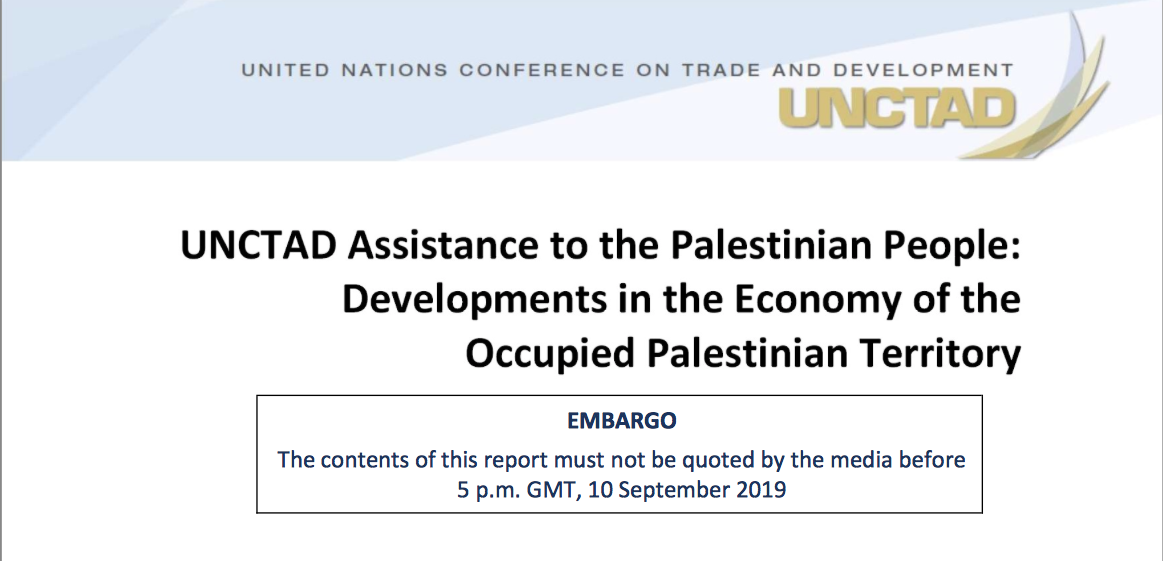How Israel Steals Palestine’s Offshore Oil and Gas Revenues. Outright Theft. Billions of Dollars Stolen
UNCTAD Assistance to the Palestinian People: Developments in the Economy of the Occupied Palestinian Territory

Executive summary
“In 2018 and early 2019, the performance of the Palestinian economy and humanitarian conditions reached an all-time low. Per capita income fell, mass unemployment increased, poverty deepened and the environmental toll of occupation has been rising in both the Gaza Strip and the West Bank.
The Palestinian people are denied the right to exploit oil and natural gas resources and thereby deprived of billions of dollars in revenue.
The international community should help the Palestinian people to secure their right to oil and gas in the Occupied Palestinian Territory and ascertain their legitimate share in the natural resources collectively owned by several neighbouring States in the region.
In March 2019, the Government of Israel started to deduct $11.5 million monthly (equivalent to $138 million annually) from Palestinian clearance revenues.
The Palestinian National Authority responded that it would not accept anything less than the full amount of its rightful clearance revenues, which represent two thirds of Palestinian fiscal revenue. This fiscal shock is compounded by declining donor support.
UNCTAD continues to respond positively to the needs of the Palestinian people. However, securing extrabudgetary resources remains critical to fulfilling the requests in the Nairobi Maafikiano and in General Assembly resolutions for UNCTAD to report on the economic costs of occupation for the Palestinian people,”
***
The UNCTAD report focusses on the impoverishment of the Palestinian population: “Falling per capita income and worsening depression-level unemployment”
It also examines in length how Israel took control of Palestine’s offshore oil and natural gas reserves in derogation of both Israeli and international law.
This constitutes an act of outright theft by Israel of billions of dollars of revenue, which is barely acknowledged by the Western media.
Below are selected excerpts of the UNCTAD Report pertaining to the theft of oil and gas revenues (emphasis added by Global Research):
Studies by geologists and natural resources economists have separately confirmed that the Occupied Palestinian Territory lies above considerable reservoirs of oil and natural gas wealth off the coast of Gaza and in the West Bank. Within this context, UNCTAD (2019) prepared a study to sketch preliminary outlines of the economic loss incurred by the Palestinian people as a result of being denied their right to develop and exploit their oil and natural gas resources.
… In 1999, the BG Group (BGG) discovered a large gas field (Gaza Marine) at a distance of 17 to 21 nautical miles off the Gaza coast. In November 1999, within the bounds of the Oslo Accords, which give PNA maritime jurisdiction over its waters up to 20 nautical miles from the coast, PNA signed a 25-year contract for gas exploration with BGG. In 2000, BGG drilled two wells in the field and carried out feasibility studies with good results.
… With reserves estimated at 1 trillion cubic feet of good quality natural gas, it was envisioned that the Palestinian people would be able to satisfy domestic demand and export the remainder. The 25-year contract gave BGG 90 per cent of the licence shares and PNA, 10 per cent, until production began. Subsequently, the PNA share was slated to increase to 40 per cent.
In July 2000, the Government of Israel granted BGG authorization to drill the first well, Marine 1. The authorization to drill the second well and the successful gas strikes at the two wells promised a potential windfall for the Palestinian people. In September 2000, the head of PNA, accompanied by Palestinian businesspeople and the media, lit the flame proving the presence of gas at the BGG offshore exploration platform. The PNA agreement with BGG included field development and the construction of a gas pipeline and the licence covered the entire Gaza offshore marine area, which is contiguous to several Israeli offshore gas facilities.
In May 2002, the Government of Israel agreed to negotiate an agreement for an annual supply of 0.05 trillion cubic feet of Palestinian gas for a period of 10 to 15 years. Yet in 2003, the Government of Israel reversed its position, stating that funds flowing to PNA could be used to support terrorism. However, in April 2007, the Government of Israel approved a proposal to renew discussions with BGG, whereby Israel would purchase 0.05 trillion cubic feet of Palestinian natural gas for $4 billion annually, starting in 2009, with profits in the order of $2 billion, of which $1 billion was to go to Palestinians. It was argued that this would generate mutual benefits deemed to foster a good atmosphere for peace.
The Government of Israel, however, had different plans for sharing revenues with Palestinians. An Israeli team of negotiators was set up to formulate a deal with BGG, bypassing Palestinians. It appeared that the Israeli team wanted the Palestinians to be paid in goods and services and insisted that no money should go to the Hamas-controlled government in Gaza. The effect was essentially to nullify the contract signed in 1999 between PNA and BGG.
In November 2008, the Ministry of Finance and the Ministry of National Infrastructures, Energy and Water Resources of Israel instructed the Israel Electric Corporation to enter into negotiations with BGG on the purchase of natural gas from the BGG offshore concession in Gaza. However, a new territorial arrangement emerged subsequent to the Israeli military operation in Gaza in December 2008, featuring the militarization and control of the entire Gaza coastline and maritime areas and the de facto confiscation of Palestinian natural gas fields and their integration into Israel’s contiguous offshore installations.
Nineteen years have passed since the drilling of Marine 1 and Marine 2. Since PNA has not been able to exploit these fields, the accumulated losses are in the billions of dollars and the Palestinian people have been denied the benefits of using this natural resource to finance socioeconomic development and meet their fiscal and energy needs.
Read the full UNCTAD report here.(pdf)
*
Note to readers: please click the share buttons above or below. Forward this article to your email lists. Crosspost on your blog site, internet forums. etc.


